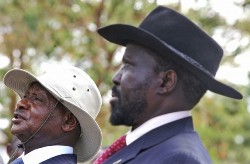S. Sudan denies country would “fall in days” if Ugandan troops withdraw
October 12, 2014 (JUBA) – Senior South Sudanese ruling party (SPLM) officials have downplayed reports that the current region under president Salva Kiir could “fall in days”, should Ugandan soldiers decide to withdraw from the conflict-ridden country.

The minister’s reactions follows reports on social media and some internet forums on which opposition activists and government critics extensively debated over the significance of military and diplomatic supports South Sudan receives from the government of Uganda.
Ayii Akol Ayii, the deputy head of humanitarian affairs for the opposition led by former vice-president Riek Machar, said he was optimistic Ugandan forces would not withdraw from South Sudan.
“I know it will not happen soon because the government of Uganda is still benefiting from the oil money. But if it happened it will be a different story. What I know is that Salva Kiir and his friends have adopted survival strategy to remain in power at any cost,” said Ayii.
“I also know that Ugandan will not do it, because its involvement in this conflict is purely for business interest but should it accept and decides today to pull out its troops in the country, believe me, Juba can fall in days,” he added.
A former lawmaker, Ayii stressed that it was important for the prime minister to be given executive powers in the transitional government to enable the implementation of democratic reform programs.
“The importance of giving executive powers to the prime minister is for two simple reasons: implement democratic reform programs and the restructuring of the current system to meet the general desire of our people. There will be institutional reforms so that we have strong institutions so that the country moves away from the tendency which favours promoting establishing strong men or women system,” said Ayii.
He said South Sudan needed strong institutions and not men or women.
“We need institutions which will respect and implement rules of law,” the rebel official said.
“The other important reason for giving executive powers to the prime minister is that it will help to run day to today activities when there are powers to direct delivery of basic services to our people. But if there are no such powers, there will not be difference from the current status quo and there will be no meaningful reforms and maintaining the same status quo is unacceptable anymore,” he added.
Tens of thousands of people have been killed and nearly 1.5 million displaced since violence broke out in the country following a political dispute in mid-December last year.
(ST)
